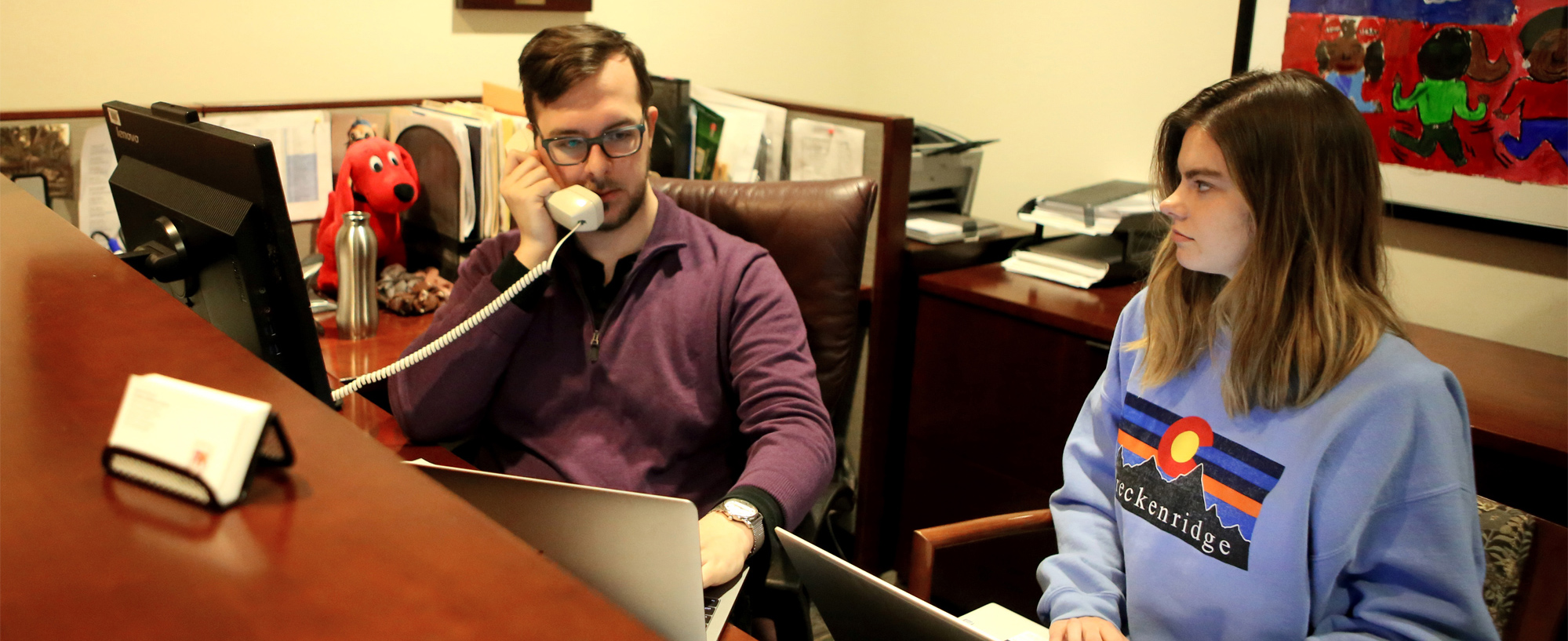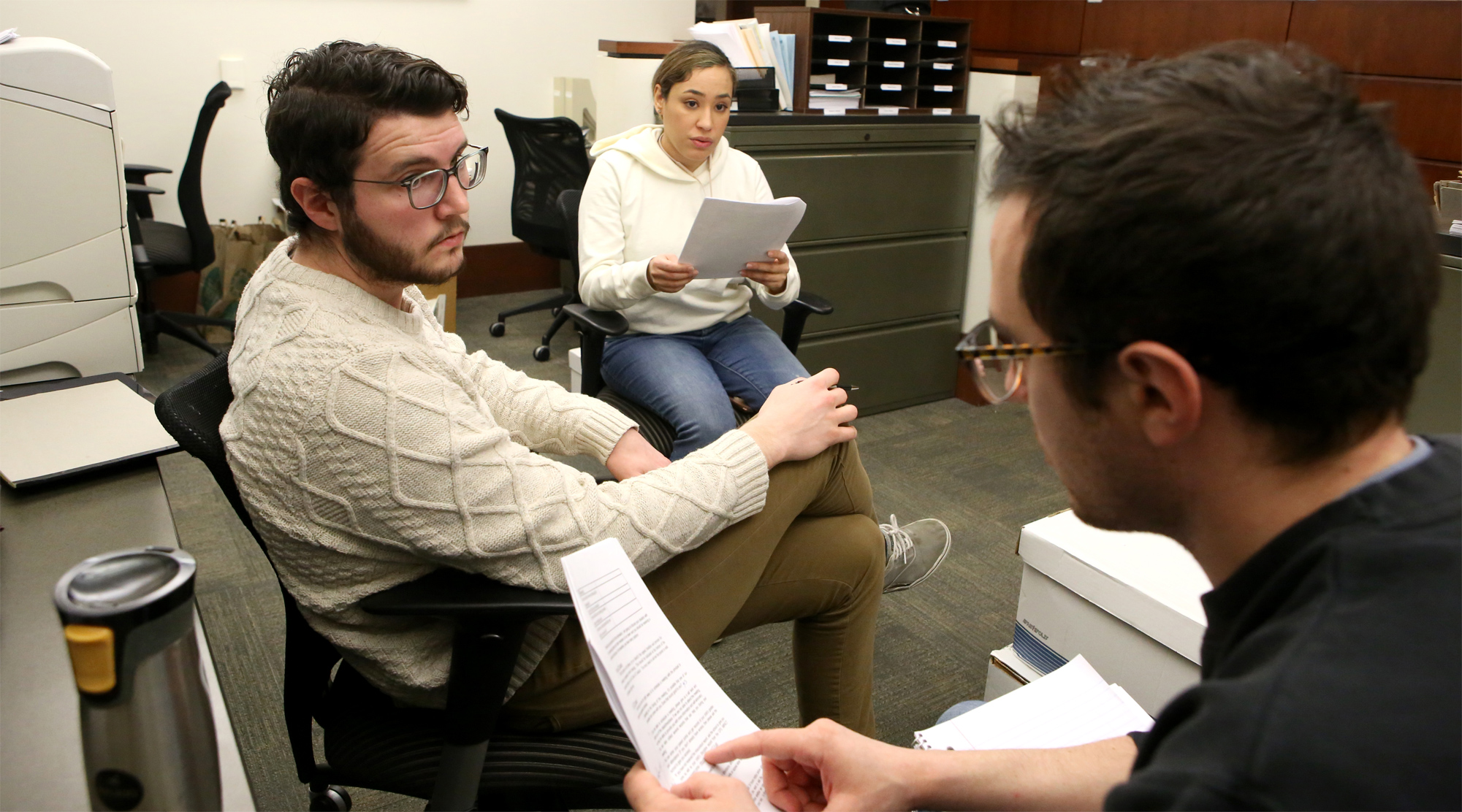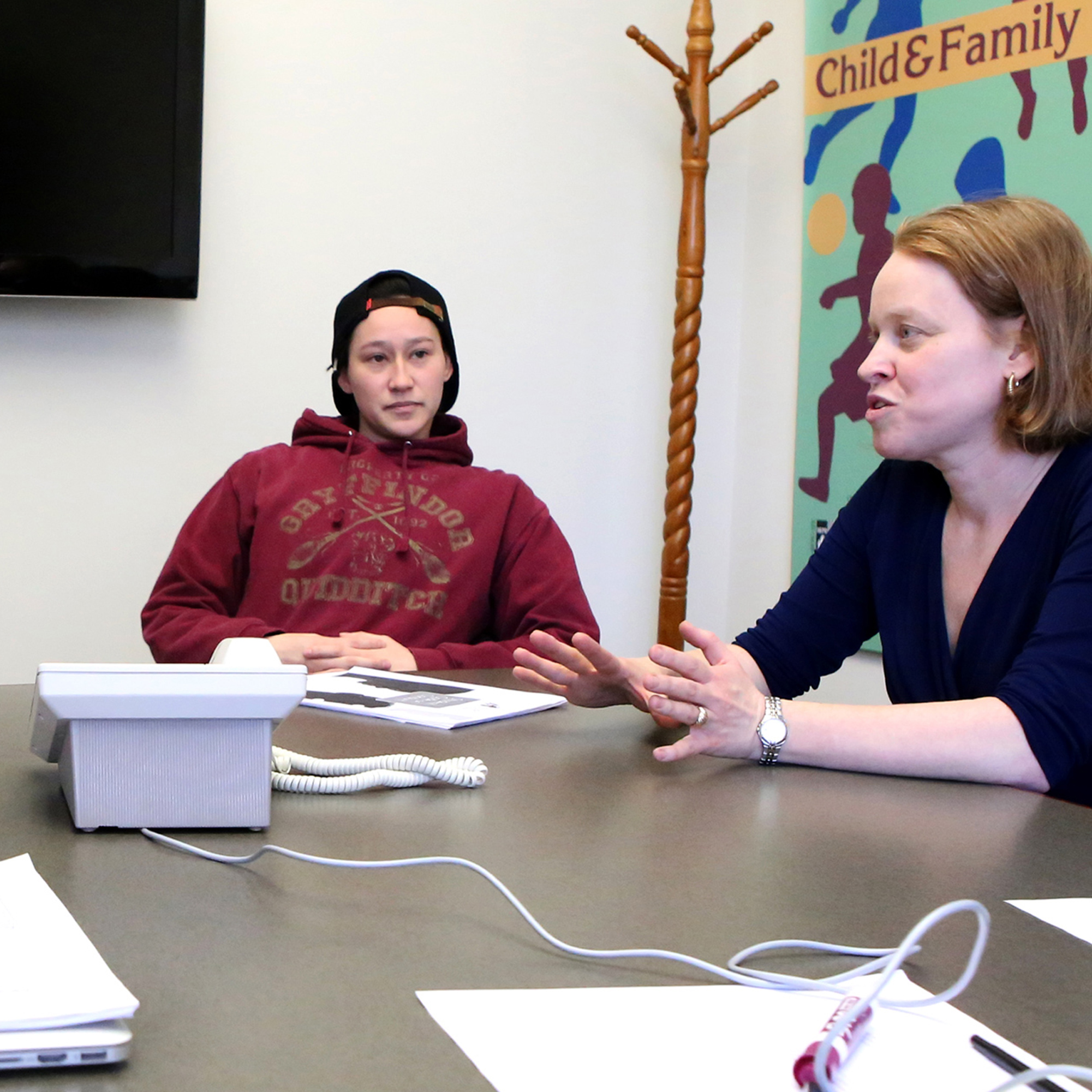Advocating for parents and children

As early as the first year, students can be trained to work with parents and children through the SUFEO hotline.
Advocating for parents and children
Student-run hotline provides real-world advocacy experience
Being an eighth-grader can be hard, but repeating the grade because of poor attendance due to health issues is even harder. Helping students and families navigate Chicago Public Schools’ Code of Conduct to appeal a grade promotion is the type of hands-on work first- and second-year Loyola law students do when they join SUFEO, or Stand Up for Each Other.
Vice president of the student organization Mehgan Keeley, 2L, oversaw that case and helped the family appeal the promotion denial. Keeley learned the student missed school due to a physical ailment that had not been properly addressed. Happily, she and the family secured the needed documentation so the student could advance to ninth grade with her classmates.
“We advocated for the student and worked with her new school to create a plan for accommodations to ensure her medical needs wouldn’t continue to be a barrier to her academic progress,” Keeley said. “She’s doing well and even made the school’s basketball team.”
1
Just one suspension increases a student's risk of dropping out of school
2x
Students suspended are two times as likely to leave school prior to graduation
25
SUFEO assists about 25 families per year

With guidance and training, students help families navigate the process of appealing school suspensions and other educational challenges.
Hands-on legal experience
At Loyola, incoming law students don’t have to wait until their third year before getting a chance to practice what they are learning in the classroom. SUFEO provides them with a taste of client interaction while advocating for Chicago-area parents and their children who are involved in school-related suspensions resulting from disciplinary and attendance issues.
“The key to true change is equipping and empowering parents and students to advocate for themselves,” said Civitas ChildLaw fellow and second-year student Brianna Hill, president of SUFEO. The goal of the organization is to reduce the use of out-of-school suspensions and keep young people in school and on track to graduate.
Because Hill also taught English as a second language for three years in Memphis before coming to Loyola, she has the advantage of seeing both sides of the issue. “As a teacher, you feel that there’s only so much you can do because you’re working within the school; but as a law student, I’m able to be a true advocate for them.”
“We wanted to provide hope and support to families early on before a preventable problem became serious. Our goal was to guide and advocate for students and their parents as they navigated the school system’s process.” Ibie Hart (JD '14), SUFEO Founder
Advocating on behalf of students and their families
When SUFEO founder Ibie Hart (JD ’14) was studying education law at Loyola, she was motivated to start the student advocacy organization.
“By the time students were being expelled, many had already had multiple suspensions,” said Hart, now chief of staff for Illinois Senator Robert Peters. “I had learned about Loyola New Orleans and Tulane’s joint SUFEO project and decided to model our program after theirs. We wanted to provide hope and support to families early on before a preventable problem became serious. Our goal was to guide and advocate for students and their parents as they navigated the school system’s process.”
Each year, Loyola law students field approximately 25 calls and are guided by a seven-member peer governing board that is supervised by Miranda Johnson, a clinical professor and director of the Educational Law & Policy Institute, a component of the School of Law’s Civitas ChildLaw Center. In addition to learning about SUFEO’s mission, first-semester students learn about school discipline and the law, and they support the group through outreach to community organizations. New members also can shadow a team leader while they do intakes and client meetings.
“When a call comes in, one of our board members assigns a team member to the case,” said Hill. “We help them navigate the suspension-appeal process,” added Johnson. “We also address other situations when the parent has hit a wall in terms of advocacy with the school to find more helpful ways to resolve the problem.”
A joint project of the Civitas ChildLaw Clinic and the Chicago Lawyers’ Committee for Civil Rights Under Law, SUFEO gives students the opportunity for real world experience early in their legal education when they otherwise might not interact with clients.
“The organization gave me a community of other students who were passionate about the same thing and that wanted to work hard to help others,” added Hill. “It’s given me a better understanding of the city of Chicago and the great need that exists for quality legal advocacy.”

Loyola’s Education Law and Policy Institute offers a comprehensive and integrated curriculum in education law. From volunteering for SUFEO to field placement through the Education Law Practicum, you can gain hands-on experience serving the educational needs of children through direct representation and policy initiatives.
Learn MoreBeing an eighth-grader can be hard, but repeating the grade because of poor attendance due to health issues is even harder. Helping students and families navigate Chicago Public Schools’ Code of Conduct to appeal a grade promotion is the type of hands-on work first- and second-year Loyola law students do when they join SUFEO, or Stand Up for Each Other.
Vice president of the student organization Mehgan Keeley, 2L, oversaw that case and helped the family appeal the promotion denial. Keeley learned the student missed school due to a physical ailment that had not been properly addressed. Happily, she and the family secured the needed documentation so the student could advance to ninth grade with her classmates.
“We advocated for the student and worked with her new school to create a plan for accommodations to ensure her medical needs wouldn’t continue to be a barrier to her academic progress,” Keeley said. “She’s doing well and even made the school’s basketball team.”
Hands-on legal experience
At Loyola, incoming law students don’t have to wait until their third year before getting a chance to practice what they are learning in the classroom. SUFEO provides them with a taste of client interaction while advocating for Chicago-area parents and their children who are involved in school-related suspensions resulting from disciplinary and attendance issues.
“The key to true change is equipping and empowering parents and students to advocate for themselves,” said Civitas ChildLaw fellow and second-year student Brianna Hill, president of SUFEO. The goal of the organization is to reduce the use of out-of-school suspensions and keep young people in school and on track to graduate.
Because Hill also taught English as a second language for three years in Memphis before coming to Loyola, she has the advantage of seeing both sides of the issue. “As a teacher, you feel that there’s only so much you can do because you’re working within the school; but as a law student, I’m able to be a true advocate for them.”
Advocating on behalf of students and their families
When SUFEO founder Ibie Hart (JD ’14) was studying education law at Loyola, she was motivated to start the student advocacy organization.
“By the time students were being expelled, many had already had multiple suspensions,” said Hart, now chief of staff for Illinois Senator Robert Peters. “I had learned about Loyola New Orleans and Tulane’s joint SUFEO project and decided to model our program after theirs. We wanted to provide hope and support to families early on before a preventable problem became serious. Our goal was to guide and advocate for students and their parents as they navigated the school system’s process.”
Each year, Loyola law students field approximately 25 calls and are guided by a seven-member peer governing board that is supervised by Miranda Johnson, a clinical professor and director of the Educational Law & Policy Institute, a component of the School of Law’s Civitas ChildLaw Center. In addition to learning about SUFEO’s mission, first-semester students learn about school discipline and the law, and they support the group through outreach to community organizations. New members also can shadow a team leader while they do intakes and client meetings.
“When a call comes in, one of our board members assigns a team member to the case,” said Hill. “We help them navigate the suspension-appeal process,” added Johnson. “We also address other situations when the parent has hit a wall in terms of advocacy with the school to find more helpful ways to resolve the problem.”
A joint project of the Civitas ChildLaw Clinic and the Chicago Lawyers’ Committee for Civil Rights Under Law, SUFEO gives students the opportunity for real world experience early in their legal education when they otherwise might not interact with clients.
“The organization gave me a community of other students who were passionate about the same thing and that wanted to work hard to help others,” added Hill. “It’s given me a better understanding of the city of Chicago and the great need that exists for quality legal advocacy.”
